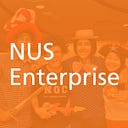Insights from Kopi Chat: Ocean of Opportunities
On 23 March 2018, at the Kopi Chat: Ocean of Opportunities by BLOCK71 Singapore, in collaboration with Symphony Creative Solutions, Daniel Sparing from Google Cloud and Kosuke Wada, SVP, BPIT Strategy and Innovation Department, Ocean Network Express (ONE), shared on the challenges of container shipping and how machine learning (ML) and artificial intelligence (AI) would disrupt the shipping industry. We’ve summarised the key takeaways below for your reading pleasure :)!
Daniel Sparing from Google Cloud spoke about how shipping and logistics companies can benefit from ML and AI to improve operations, reduce cost, and increase safety. Recent advances in ML software, specialized hardware, and cloud technology make it possible today for traditional enterprises as well as startups to quickly and affordably develop ML systems for a wide range of use cases, such as improving the safety and quality of food production and music discovery.
The majority of Google’s products use some kinds of ML models, from Google Translate to the Smart Reply feature in Gmail. Google’s goal is to make the benefits of ML available to everyone. That’s why Google has open-sourced TensorFlow, the machine learning framework working in the background of many Google products, and made a managed TensorFlow service available as part of Google Cloud. In February 2018, Google also announced that Tensor Processing Units (TPU), custom hardware dedicated to speed up large-scale ML, will be available in beta to Google Cloud customers. Beyond serving ML researchers, products like the machine learning APIs and Cloud AutoML aim to democratize ML by enabling any software developer to use ML models.
Google Cloud AI technology is being adopted by many companies in the logistics and shipping industry includingGlobal Fishing Watch, who use ML detecting illegal fishing from vessel tracking data, and Rolls Royce partnering with Google Cloud to work on autonomous navigation.
Q&A
What is the future of processing the document of bill of lading?
In the shipping industry, paper bill of lading is legal document serving as receipt, as evidence of carriage contract and as document of title. So, using machines to parse information from emails/papers in issuing legal document may cause many troubles as the accuracy of current software is not up to acceptable legal standards yet. Also, due to the global nature of the industry, all countries involved have to give official approval of the changes to electronic bill of ladings. — Mr Jinsoon Park, ONE
In shipping, safety and security is paramount. With changes in technology, do you foresee any challenges in these areas?
These technologies have been around for a long time and we have experienced security breaches such as viruses infiltrating our system or ships leaving our network in areas where the internet access is not available, but we have learnt from such incidents and improved our systems. Also, general improvements in tech such as speed of Internet access has definitely helped. — Mr Ryo Kakuta, ONE
What is your view of blockchain involvement in the industry?
There is definitely space for blockchain to improve the transaction process but there are still concerns about the regulation of this technology and since shipping is inherently multi-national, there is a need for approval to be given in all countries. Thus, the uptake of this technology is has slowed but we are still keeping an eye on the future potential applications of blockchain. — Mr Kosuke Wada, ONE
Are you an entrepreneur working on a cool product and looking for more than just a co-working space ? Do apply for a hotdesk here and become part of the exciting community that we offer at BLOCK71 Singapore.
For more great entrepreneur themed articles delivered weekly to your inbox, subscribe to the BLOCK71 newsletter here!
